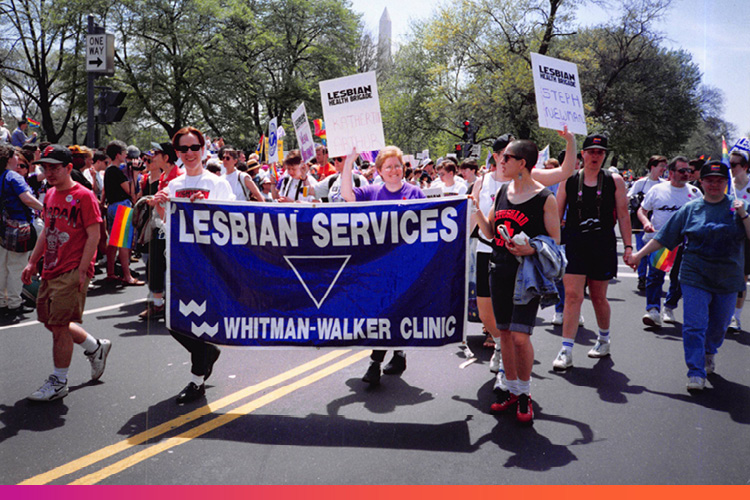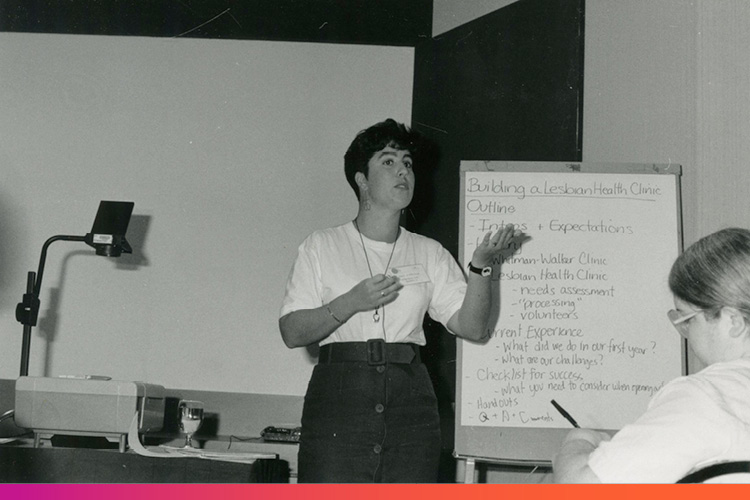As part of Whitman-Walker’s 40th anniversary, officially January 13, 2018, we’re sharing 40 stories to help tell the narrative of the Whitman-Walker community. This week meet Amelie Zurn! Amelie moved to DC in the summer of 1986 to work for the National Organization for Women (NOW) with a passion for feminism within community organizing. With the rise of the AIDS crisis, Amelie’s path crossed with Whitman-Walker where she served as a volunteer on the AIDS information hotline and eventually became the first director of the Lesbian Services Program (LSP).
Click the orange play button below to hear Amelie’s 2018 oral history – a recorded interview with an individual having personal knowledge of past events.
Five Quotes from Amelie’s Oral History
On Finding Community at Whitman-Walker:
“I would say that I felt much more at home when I started volunteering at Whitman-Walker. I felt like one of the amazing things about Whitman-Walker, I think in the 80s, was that it created a space of refuge and a space of celebration. And so, there was always a sense, you know, we lost really a lot of people, but it really felt like, ‘We’re here, and we’re connected in the middle of this, you know, war on our bodies, and you know, there’s, there’s still reason to be proud and to be comfortable and be connected to who we are.’ So, I think that had a huge impact on me feeling more comfortable and also, more of a call to figure out sort of who I was and to claim an identity. I think that the feminist movement was struggling a little bit more with still sort of, ‘Is it okay that there are dykes in our movement?’ So, I always actually felt a little bit more at home at Whitman-Walker which was maybe there weren’t as many out lesbians but, as there were gay men, but there was definitely a sense of, ‘You know, you’re here. You’re family. We want you here. Everybody’s fighting for this common goal of, you know, trying to combat this illness.’”
On the AIDS Education Hotline:
“Well, all of us, all the volun-, it was a volunteer-staffed hotline. And we all, I think, did, I can’t remember whether we did two-hour shifts or four-hour shifts. Maybe we did four-hour shifts. So, I would usually do it once a, once a week. And then later, I did, I started doing some assistance like helping with volunteer materials and helping to do some scheduling.
And one of the amazing things about the leadership at that time, Ken Yamaguchi-Clark, who was the director at the time, is that he made it so that the daytime availability there were always two positions that were funded that were people living with HIV which was kind of at the time radical, because you were having this split between people living with HIV and voices of medical providers or social work providers. So, the fact that Ken basically meant that set always had a person living with HIV working on the hotline during the day was huge, I think movement towards the empowerment of people living with HIV disease. And for me, it was really in line with things that I had learned in school and even at NOW [National Organization for Women] about women’s health movement and sort of the empowerment of women’s voices which is, it’s not doctors telling us what’s happening with our bodies. It’s sort of us learning about our bodies and ourselves. And so, I felt like Ken was really a leader in the clinic in terms of having people living with these illnesses be voices within the community, so that it didn’t become all about the science heads or the medical heads or the social service heads.
So, it was something that I thought was really an amazing component of my work at the AIDS Hotline. So, I often because I had daytime shifts, I had often worked with those folks and so, when I took over the job as the Director of the AIDS Hotline, I kept that going. We always had two staff people who were people living with HIV, and they would get basically a stipend that – because many of them were on full-time disability, so they had limits about how much they could earn. But it basically was a way for me to keep us honest as a hotline, and not have it be too abstracted from people who were actually living with the disease.”
On Lesbian Health:
“And so, I think about that time there was kind of this hotbed of like, ‘What is the clinic doing as we mushroom-cloud in HIV and AIDS? How are we treating gay men and lesbians? And are they still important?’ and so, in 1990, with conversations starting in ‘89, in 1990 there started to be these very serious conversations about, ‘Can we reaffirm our commitment as a lesbian and gay health clinic that’s serving, that is also the largest AIDS service providers in the city?’ Right?
So, the board made a decision to sort of reaffirm its commitment to lesbian and gay health issues. So, that meant that the Gay Men’s VD Clinic didn’t have to worry about being, you know, sort of a space, and the Gay Men’s Peer Counseling Collective didn’t have to worry about having a space. And so, likewise things like the Lesbian Resource and Counseling Center which had been there for a long time or calls that we got all the time about lesbians choosing children, you know, that we would have occasional workshops on. We would actually have a home. So, Lesbian Services was born out of that re-commitment of the board to create gay and lesbian health programs. So, in 1990, that sort of summer they reaffirmed the origins of the Lesbian Health Program and Lesbian Services specifically.”

Amelie holds the left side of the Lesbian Services Program (LSP) banner as local LSP volunteers and national lesbian health leaders march in the “Lesbian Brigade” in the April 1993 National March on Washington for LGBT Rights and Liberation.
On Mautner Project:
“So, the other piece that was interesting was that I was also involved in the beginning of the Mautner Project which was a separate organization, and I was very close with Susan Hester, the founding director there. And what was great about that was that I felt like Lesbian Services at Whitman-Walker and a free-standing lesbian organization together could be a really strong response to the community needs. So, that was definitely wonderful and challenging sort of, you know.
They decided to focus on cancer because they sort of wanted to focus their services, and the truth was that most of the money was for education and outreach and getting people screened and tested meaning detection money, like the CDC money was all detection cancer detection money, but there wasn’t much treatment money. So, they were having a support group where there wasn’t a lot of treatment money. So, I felt like, you know, Lesbian Services, a lot of the things that we did and didn’t do were basically because Mautner Project was doing these other kind of organizing which is sort of my ideal way to organize which is you have many different organizations that are coming together to do different parts of the soup of our bodies and our lives, you know?”

A speaker leads a talk on building a lesbian health clinic – identifying needs and expectations for Whitman-Walker.
On Her First Impressions After Hearing the term HIV:
“Hmm. Well, I think many people naïvely thought, ‘This is a virus. We’ll find a cure. This is, you know.’ Before we even knew it was a virus, this is, ‘We’re going to find a cure. This will be done in a little while.’ I think the unique way that it brought up sexuality and sort of all of the intersections of oppression, you know, it’s just kind of like, ‘Hang in there. This is going to be around, and we’re going to see this play out the way that many other epidemics play themselves out.’ But also, that naïvely wonderful sense that we could make a difference is kind of incredible too. So, I don’t know, I mean I guess people would have just said, ‘Hang in there.’ Which I knew I already had to hang in there, but so, I think there was a lot of optimism for me that getting into HIV/AIDS that people would feel more comfortable and more connected to their bodies and could really work towards creating lives that they felt in control of and empowered around. I think that was always my hope, and I think that’s true for some people and some people not. I mean, I think, I know we still have so much work to do.”


